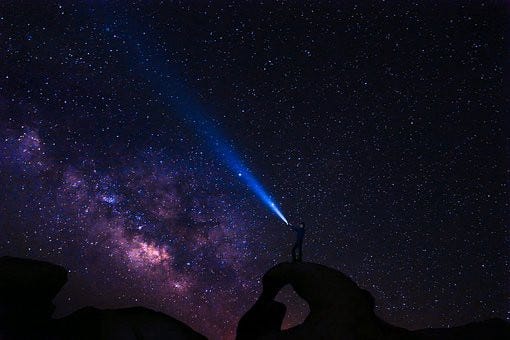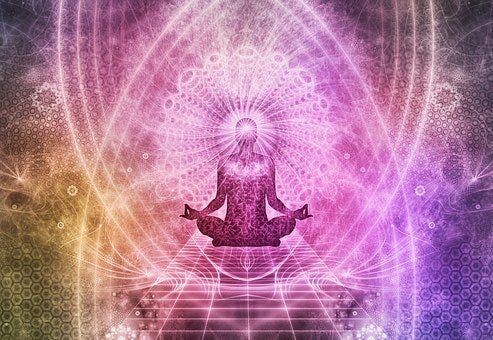
This follows on from part 1, and is the second in a series in response to an article by Ted Wade on Medium, which claimed that the ‘supernatural’ is a figment of humans’ imagination. My series will be a defence of the concept of the supernatural. My belief is that the material universe emerges from other levels of reality, often, though not necessarily, conceived of as being ‘higher’, which is why I call them supernatural. In this article I offer evidence for their existence, and later in the series I’ll discuss what might be found in them.
This understanding can be found in many ancient traditions — Hinduism, Buddhism, Taoism, Kabbalah, Old Testament Judaism, Gnosticism — and also in modern esotericism, for example Theosophy, and various secret societies. Jonathan Black is a spokesman for their worldview, as explained in part 1, and I especially like how he expresses this idea: “For many of the world’s most brilliant individuals the birth of the universe, the mysterious transition from no-matter to matter has been explained in just such a way. They have envisaged an impulse squeezing out of another dimension into this one — and they have conceived of this other dimension as the mind of God”¹. (In the Black quotes in part 1, he elaborates on this understanding, showing that he means several dimensions.)
So is this some kind of mystical mumbo-jumbo? Actually no; it is what quantum physicists have been saying for nearly a hundred years. They are at the vanguard of those scientists who reject the old materialist, mechanistic worldview which emerged from the ‘Enlightenment’, and quantum physics has been described as the best ever theory of physical reality in the history of science
I assume that Wade knows about quantum physics but does not mention it in his article. In our correspondence he has mentioned: astronomy, geology, paleontology, archaeology, evolutionary biology, embryology, genetics and genomics, geology, radiochemistry, population biology, island ecology, and planetary science. However, as Plato might say, those working in these fields probably don’t realise that they are merely looking at shadows on a wall, and cannot see the (supernatural) source of those shadows. To push the comparison further, quantum physicists seem to represent that one prisoner in Plato’s allegory who has realised what is going on, and who is trying to wake the others up to the reality of the situation. They remain impervious to all attempts to persuade them, however.
Here are some relevant quotes from quantum physicists down the years, beginning with the early pioneers:
- Werner Heisenberg, one of the founders, said: “Modern physics has definitely decided for Plato. The smallest units of matter are not physical objects… They are forms, structures, or — in Plato’s sense — Ideas”².
- Max Planck, sounding remarkably like the Jonathan Black quote above: “There is no matter as such! All matter originates and exists only by virtue of a force which brings the particles of an atom to vibration and holds this most minute solar system of the atom together… We must assume behind this force the existence of a conscious and intelligent Mind. This Mind is the matrix of all matter”³.
- Sir James Jeans: “Today there is a wide measure of agreement, which on the physical side of science approaches almost to unanimity, that the stream of knowledge is heading towards a non-mechanical reality; the universe begins to look more like a great thought than like a great machine. Mind no longer appears as an accidental intruder into the realm of matter; we are beginning to suspect that we ought rather to hail it as the creator and governor of the realm of matter — not of course our individual minds, but the mind in which the atoms out of which our individual minds have grown exist as thoughts”⁴. (Jeans uses Plato’s allegory of the cave as the epigram for his book.)
Also one of the early pioneers, Sir Arthur Eddington is especially important on these questions. He gave the Swarthmore lecture in 1929, the title of which is highly significant, Science and the Unseen World⁵. What is the unseen world if not the supernatural? The title of his fourth section is ‘Both a scientific and a mystical outlook are involved in the “problem of experience” ‘. (I think it is reasonable to equate ‘mystical’ with ‘supernatural’.) On that point, he considers the question, “is the unseen world revealed by the mystical outlook a reality?”, and thinks that it is better put “Are we, in pursuing the mystical outlook, facing the hard facts of experience?” His answer is: “Surely we are. I think that those who would wish to take cognisance of nothing but the measurements of the scientific world made by our sense-organs are shirking one of the most immediate facts of experience, namely that consciousness is not wholly, nor even primarily a device for receiving sense impressions. We may the more boldly insist that there is another outlook than the scientific one, because in practice a more transcendental outlook is almost universally admitted” (p 26–27).
Earlier in the lecture he had said: “That environment of space and time and matter, of light and colour and concrete things, which seems so vividly real to us is probed deeply by every device of physical science and at bottom we reach symbols. Its substance has melted into shadow (referencing Plato there). None the less it remains a real world if there is a background to the symbols — an unknown quantity which the mathematical symbol x stands for”. Here I would equate the ‘background to the symbols’ and the ‘unknown quantity’ with the supernatural.
Eddington continues, clearly saying that consciousness is not generated by the brain: “We think we are not wholly cut off from this background. It is to this background that our own personality and consciousness belong, and those spiritual aspects of our nature not to be described by any symbolism or at least not by symbolism of the numerical kind to which mathematical physics has hitherto restricted itself” (p23).
Among a later generation of quantum physicists we find:
- Fritjof Capra who, having understood the implications of the revolution in physics, wrote The Tao of Physics, comparing its findings to Hinduism, Buddhism, Taoism, and Zen.
- David Bohm, whose concepts of explicate and implicate orders clearly refer to the material world and the hidden background out of which it emerges⁶.
- Danah Zohar likewise: “The quantum vacuum… is the basic, fundamental and underlying reality of which everything in this universe — including ourselves — is an expression”. The quantum vacuum “can be conceived as… a sea of potential… The vacuum is the substrate of all that is”⁷.
Here this vacuum begins to sound more and more like an infinite God: “At the subatomic level of elementary particles, there is no death in the sense of permanent loss. The quantum vacuum, which is the underlying reality of all that is, exists eternally” (p124).
And here she dares to use the actual word: “If we were looking for something that we could conceive of as God within the universe of the new physics, this ground state, coherent quantum vacuum might be a good place to start” (p208).
It’s interesting to note that in the spiritual traditions mentioned above, the ultimate ground of being is described as a void or nothingness (vacuum?).
And here is some idle speculation — I’m just letting my mind wander. If Zohar is correct in saying that elementary particles do not die, perhaps also they were not born. In which case, can it be true to say that there was a Big Bang? Perhaps the universe is eternal. If not, where were the particles at the singularity? Along the same lines, if the apparently expanding universe at some point begins to contract again, as some cosmologists have speculated, if particles do not die, then where will they go to at the Big Crunch, as the universe returns to a singularity? I assume that the quantum vacuum (God?) will remain, no matter what.
In conclusion, to sum up neatly all the above quotes, here are the physicists Fred Alan Wolf and Bob Toben: “We know that there is something beyond spacetime; we just don’t know what it is. Because Beyond Space-Time is non physical, unmeasurable… But what is beyond space-time is within everything”. That sounds like a pretty good description of the supernatural and its relationship to the natural to me. They continue: “Can it connect with us and influence us within space-time? Is it pure CONSCIOUSNESS?”⁸.
If it is pure consciousness, this would corroborate and vindicate what all the ancient spiritual traditions have been saying for thousands of years.
======================================================================================================
Click here for part 3.

Footnotes:
1. The Secret History of the World, Quercus, 2010, p30
2. quoted by Ken Wilber in Quantum Questions, Shambala, 1984, p51
3. lecture given in Florence, quoted by John Davidson in The Secret of the Creative Vacuum
4. The Mysterious Universe, Cambridge University Press, 1930, my edition 1947, p137
5. transcribed into book form by Quaker Books, 2007
6. The best example from his writings on this theme is Wholeness and the Implicate Order.
7. The Quantum Self, Flamingo, 1991, p207–8
8. Space-time and Beyond, Bantam, 1983, p56